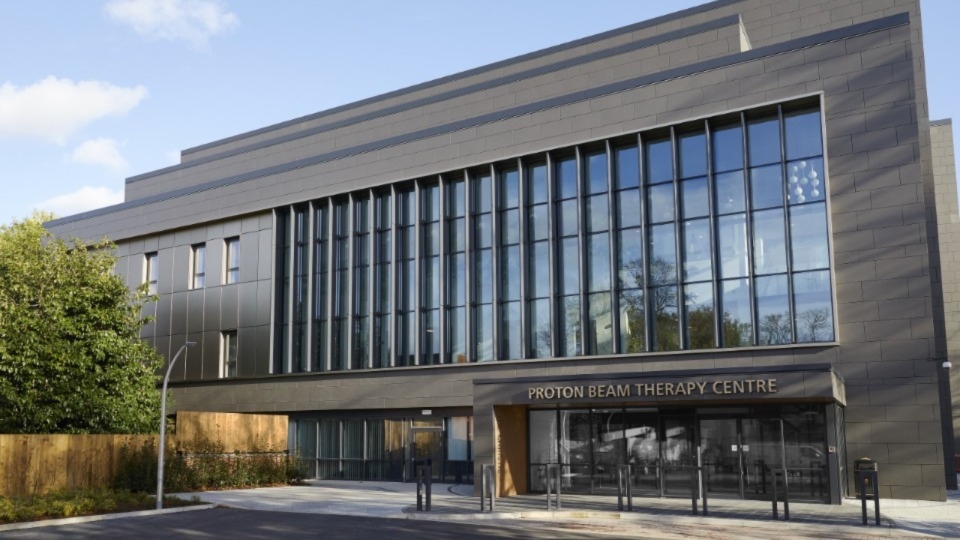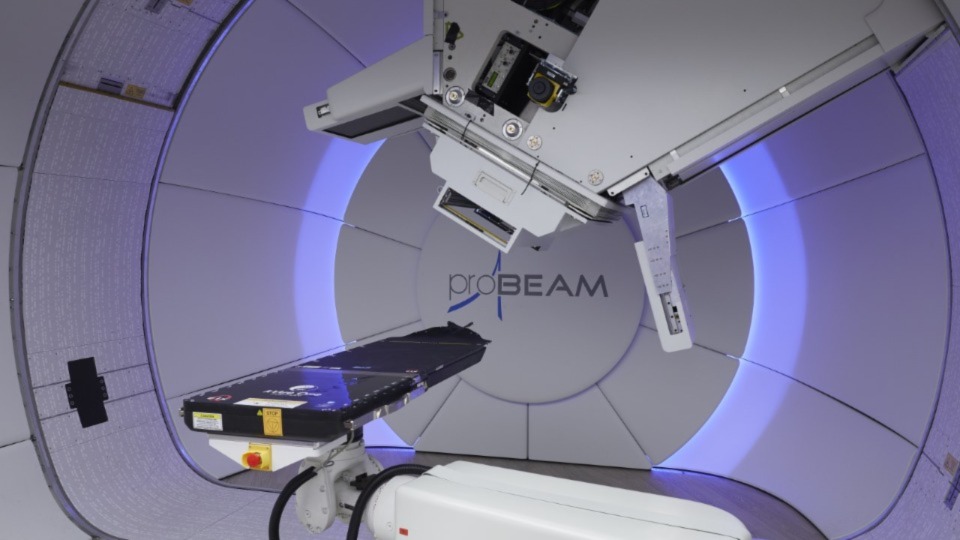Multi-million pound research grants will help find kinder cancer treatments
Date published: 17 December 2022

Proton beam therapy uses high energy particles called protons to deliver a lethal dose of radiation to cancer cells
More than £2.2 million is coming to Manchester to help fund two cutting-edge research projects to find kinder treatments for cancer.
Cancer Research UK has awarded grants to two Manchester-based cancer scientists for their work on new forms of radiotherapy, which attack tumours while reducing damage to healthy tissue around them.
Thanks to a large donation from The Taylor Family Foundation, Cancer Research UK has awarded £2.1 million to a clinical trial at The Christie NHS Foundation Trust in Manchester, which is home to the UK’s first NHS proton beam therapy centre.
Proton beam therapy uses high energy particles called protons to deliver a lethal dose of radiation to cancer cells.
The proton beam can be targeted onto the tumour with pinpoint accuracy, significantly reducing the damage to healthy tissue around it.
Currently, proton beam therapy is only available for treating some types of cancer.
But with new funding from Cancer Research UK, scientists are hoping to be able to offer it to more patients.
The PROTIS trial will see scientists from The Christie and University College Hospitals in London recruit 276 patients with sinus cancer – a rare form of head and neck cancer - from across the UK.
Over a nine-year period, half of the patients will receive proton beam therapy, with the other half receiving standard radiotherapy.
The scientists hope that the results of the PROTIS trial will enable more patients to benefit from proton beam therapy.
If the trial is successful, proton beam therapy could be routinely commissioned by the NHS for treating head and neck cancer.
Professor David Thomson, Consultant Clinical Oncologist at The Christie NHS Foundation Trust, is leading the trial with Jason Fleming, Senior Clinical Lecturer at Liverpool University.
Professor Thomson said: “Delivering high dose radiotherapy to the sinuses is complicated, because of the nearby sensitive normal tissues that can be damaged, including the eyes, brain, and inner ear.
"Proton beam therapy offers high precision treatment, which for patients with sinus cancer may improve the chance of cure, while also being a kinder treatment with less side effects.
"We’re grateful to Cancer Research UK and The Taylor Family Foundation for supporting research into this innovative cancer treatment."
A second grant of £100,000 will go to a 12-month research project investigating if a new lightning-fast version of radiotherapy could be more effective than current treatments and have fewer side effects for cancer patients.
The technique, known as FLASH radiotherapy, blasts cancer cells with a short but very high dose of radiation.

It has been shown to shrink tumours whilst reducing damage to neighbouring healthy tissue, but it currently has limited use.
A research team, led by Dr Michael Merchant at The University of Manchester, will work alongside scientists in Cambridge and Oxford to find the most effective route to deliver FLASH radiotherapy.
They hope that it will help doctors decide which patients will benefit most from FLASH radiotherapy.
Dr Merchant said: “With a click of the fingers, FLASH can deliver a blast of cancer-killing radiation which spares healthy tissues around the tumour.
"It’s an unusual biological effect which we need to understand fully.
"We want to investigate how FLASH radiotherapy could be used in the clinic, and which patients could benefit from it most.
"We will put our findings into treatment planning software to allow doctors to calculate the best type of radiotherapy for patients.
"With this new funding from Cancer Research UK, we’ll figure out where FLASH radiotherapy works best, and then we aim to take that knowledge into clinical trials to benefit future cancer patients.”
The funding comes as Cancer Research UK celebrates its 20th anniversary, though its history dates back to the founding of the Imperial Cancer Research Fund in 1902.
During this time, the charity has been a key player in the development of radiotherapy.
It has been investigating its use in cancer medicine for nearly a century and, thanks to the generosity of its supporters, is committed to funding research into improving this cornerstone of cancer treatment.
Dr Catherine Elliott, Director of Research for Cancer Research UK, said: “We’re motivated by the prospect of kinder cancer treatments which will move us towards our goal of three in four people surviving their cancer by 2034.
"The Christie and The University of Manchester have a strong track record of research, innovation and world firsts, giving patients access to cutting-edge treatment technologies and the latest clinical trials.
"With the support of The Taylor Family Foundation, Cancer Research UK-funded scientists will take discoveries from the lab into the clinic, connecting patients with the latest developments in medical research.”
To support life-saving research, donate monthly to Cancer Research UK at: cruk.org/donate
Do you have a story for us? Want to tell us about something going on in and around Oldham? Let us know by emailing news@oldham-chronicle.co.uk , calling our Oldham-based newsroom on 0161 633 2121 , tweeting us @oldhamchronicle or messaging us through our Facebook page. All contact will be treated in confidence.
Most Viewed News Stories
- 1Sentences handed down following 'brutal' manslaughter of Martin Shaw in 2023
- 2From the pitch to the classroom - Dan’s second career kicks off
- 3Police issue appeal following fatal collision on Asda car park in Shaw
- 4Two arrested following early morning raids in Royton
- 5Oldham Coliseum doors remain firmly shut




